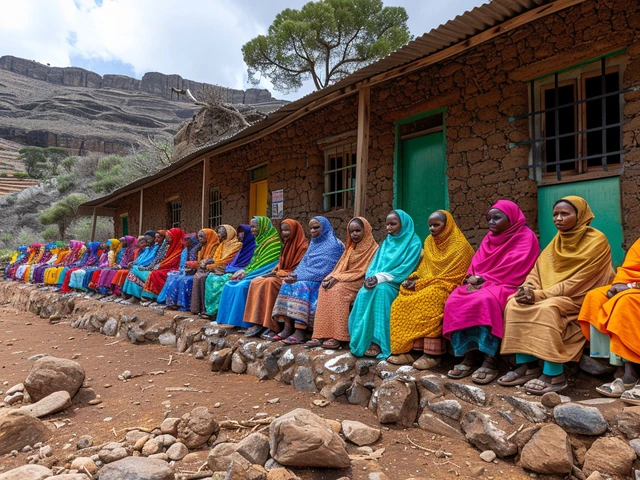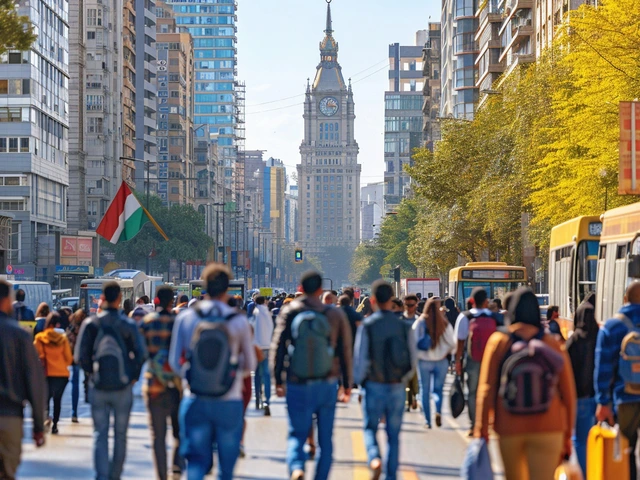Ethiopia, a land with a rich history and diverse culture, is often seen through many lenses, each revealing different facets of its living conditions. When it comes to quality of life, understanding the salary conditions is essential. Let's take a journey through various aspects that shape life in Ethiopia, starting with the economic landscape and concluding with practical tips for expatriates.
Ethiopia's economy has shown consistent growth in recent years. This vibrancy trickles down to various sectors like agriculture, manufacturing, and services, providing ample job opportunities. Understanding these opportunities is key to grasping the salary landscape.
Then there's the matter of average salaries. How much can one expect to earn in different fields? This section will shed light on typical wages and how they compare to global standards. Equally important is the cost of living, which includes housing, food, and transportation expenses.
But numbers only tell part of the story. Work-life balance in Ethiopia also plays a crucial role in determining quality of life. Whether it's the work culture in cities like Addis Ababa or the appeal of rural areas, this section offers valuable insights.
Finally, for those considering a move to Ethiopia or just curious, practical tips can make a world of difference. From navigating local customs to making the most out of your salary, these suggestions aim to make life a bit easier and more enjoyable.
- Economic Landscape
- Employment Opportunities
- Average Salaries
- Cost of Living
- Work-Life Balance
- Tips for Expats
Economic Landscape
The economic landscape of Ethiopia has been undergoing significant changes in recent years, transitioning from a largely agrarian society to a more diversified economy. This shift is evident in the country’s growing Gross Domestic Product (GDP), which has seen substantial increases. According to the World Bank, Ethiopia's economy has been growing at an annual rate of about 9.4%, making it one of the fastest-growing economies in Africa. This economic growth is mainly driven by investments in infrastructure, industry, and services sectors.
Agriculture still plays a crucial role in Ethiopia’s economy, employing around 70% of the population. Coffee is one of the country’s most significant exports, with Ethiopia being one of the top coffee producers globally. This sector is not without challenges, however, as it is highly susceptible to climatic changes. Efforts to modernize farming practices and introduce more sustainable techniques are ongoing, aimed at making the sector more resilient.
The manufacturing sector is also making strides, especially with the establishment of industrial parks that attract foreign investors. Products like textiles, leather goods, and processed foods are increasingly being produced for both domestic and international markets. The government has been keen on creating a conducive environment for businesses, offering incentives such as tax holidays and subsidized land leases. This has led to a steady increase in manufacturing jobs, which holds promise for economic diversification and stability.
In contrast to the rapid industrialization, the services sector has also been expanding. Financial services, telecommunications, and retail are some of the fastest-growing areas. The introduction of mobile banking and digital financial services has revolutionized how people manage their finances, especially in rural areas where traditional banking services are often inaccessible.
Foreign investment has also played a transformative role. Countries like China, Turkey, and India are some of the key players investing in Ethiopia's infrastructure, including roads, railways, and energy projects. These investments not only enhance the country’s connectivity but also provide jobs and improve the overall quality of life.
Despite these positive developments, Ethiopia also faces economic challenges. High inflation rates, unemployment, and a growing population put pressure on resources and services. Political instability and ethnic tensions can also disrupt economic activities, although efforts are being made to address these issues through inclusive policies and reconciliation initiatives.
Talking about the bustling capital, Addis Ababa, the city is often seen as a microcosm of Ethiopia’s economic ambitions and challenges. From gleaming skyscrapers to bustling markets, the city reflects the dualities of rapid development and enduring struggles. Real estate is booming, attracting both local and foreign investors, while public transportation systems like the Light Rail Transit (LRT) are improving urban mobility.
In summary, Ethiopia's economic landscape is a tapestry of rapid growth, diversification, and ongoing challenges. The continued focus on modernization, foreign investment, and sustainable practices paints a promising yet complex picture of a nation on the rise.
Employment Opportunities
When looking at Ethiopia's salary conditions, it's crucial to first understand the employment landscape. Agriculture is the backbone of Ethiopia's economy, employing a significant portion of the population. Crops like coffee, teff, and pulses are primary exports, creating numerous jobs in farming and related industries. While agriculture is prevalent, Ethiopia’s economy is diversifying.
In recent years, the government has made strides in boosting the manufacturing sector. Industrial parks have sprouted around the country, offering employment in textile, leather, and food processing industries. These parks not only bring jobs but also create ripple effects, spurring local businesses and services. Manufacturing offers a range of positions from unskilled labor to technical roles that often come with better salaries.
The services sector is another growing facet of Ethiopia’s economic fabric. Addis Ababa, the bustling capital, is a hub for financial services, telecommunications, and hospitality. Banks and telecom companies like Ethio Telecom offer lucrative employment opportunities. These roles often provide higher wages and benefits, attracting many young professionals.
According to Dani Abebe, an economist based in Addis Ababa, "Ethiopia's service sector has seen significant growth, contributing to the creation of high-paying jobs in urban areas."
Information technology is another emerging field. Tech startups are mushrooming, thanks to initiatives encouraging innovation and entrepreneurship. Software development, digital marketing, and tech support roles are increasing, presenting new avenues for lucrative employment. Educational institutions are also ramping up IT training, preparing a skilled workforce for the future.
Health and education are essential areas where Ethiopia has a persistent need for skilled professionals. The government aims to improve healthcare infrastructure and educational facilities, thus creating many job opportunities for doctors, nurses, teachers, and administrative staff. These sectors not only offer meaningful work but also come with salaries that ensure a comfortable living standard.
The tourism sector is not to be overlooked. Ethiopia boasts numerous historical sites, national parks, and cultural festivals that attract tourists. Jobs in hotels, travel agencies, and cultural centers are plentiful. While salaries might not be as high as in tech or finance, the sector offers diverse opportunities, especially for those passionate about showcasing Ethiopian heritage.
Foreign investors are increasingly eyeing Ethiopia, drawn by its growing market and youthful demographic. Foreign Direct Investment (FDI) is strong in industries like renewable energy, real estate, and retail. Such investments often come with the promise of job creation and competitive wages, particularly in urban centers.
In summary, Ethiopia's job market is varied and evolving. From its agricultural roots to the burgeoning tech scene, opportunities abound for those looking to build a career. Whether you're an Ethiopian resident or considering a move, understanding these dynamics can help you navigate the job market effectively. It’s an exciting time for employment in Ethiopia, with many sectors ripe for talent and growth.

Average Salaries
When we talk about salaries in Ethiopia, it's essential to understand the diversity of income levels across various professions. The capital, Addis Ababa, often sees higher wages compared to rural areas, a common trend in many countries. Entry-level positions such as administrative assistants or clerks can expect a monthly salary ranging between 2,500 to 5,000 Ethiopian Birr (approximately $50 to $100 USD). While this might seem low compared to Western standards, it's crucial to consider the local context and cost of living.
For those in specialized fields, earnings can be considerably higher. For instance, software developers or engineers can earn between 10,000 to 25,000 Birr per month ($200 to $500 USD). These roles often require specific skill sets and educational backgrounds, which justifies the higher compensation. Teachers, especially those in international schools, can also command salaries on the upper end of this spectrum. Healthcare professionals, such as doctors and nurses, generally earn good wages, reflecting their critical role in society.
Let's not forget about the agricultural sector, which employs a large portion of the Ethiopian population. Farmers typically earn around 3,000 to 6,000 Birr ($60 to $120 USD) per month, depending on the crops they grow and market conditions. Despite the modest income, agricultural workers benefit from being part of a community where barter and informal economies still play a significant role.
For expatriates or those working for international organizations, salaries can be significantly higher. Such roles might offer compensation packages that include housing, transportation, and other allowances, making the financial aspect of life in Ethiopia much more comfortable. This is one reason why many foreign professionals find working in Ethiopia quite rewarding.
"Salaries in Ethiopia vary widely depending on the industry and level of expertise," says Yohannes Haile-Mariam, an economist at Addis Ababa University. "While urban areas like Addis Ababa offer more lucrative opportunities, rural regions often rely on traditional forms of income."
It's not uncommon for salaries to be supplemented by informal earnings. Many people engage in side businesses or freelance work to increase their income. This entrepreneurial spirit is evident in markets and street vendors who contribute to the vibrant local economy. Additionally, the government has been making strides to improve minimum wage policies, aiming to boost living standards.
A key point to consider is the disparity between urban and rural earnings. While people in cities might have higher salaries, they also face a higher cost of living. On the other hand, rural residents benefit from lower expenses, even if their incomes are modest. This balance plays a crucial role in understanding the broader picture of salary conditions in Ethiopia.
When it comes to negotiating salaries, knowledge is power. Awareness of the average earnings in your field can provide a solid foundation for discussions with potential employers. Whether you are a local resident or an expatriate, understanding these dynamics can help in making informed decisions about career paths and financial planning.
Cost of Living
Living in Ethiopia can offer a unique experience with a relatively low cost of living compared to many Western countries. However, it's important to understand the specifics to gauge how far your salary can stretch. The cost of housing, food, transportation, and utilities varies widely between urban and rural areas.
In the capital city of Addis Ababa, rent is one of the more significant expenses. A one-bedroom apartment in the city center can cost around $400 per month, while the same apartment outside the center might be approximately $200. For larger families, a three-bedroom apartment in the city center can reach up to $1,000 monthly. It's vital to consider these costs if you’re planning to move or work in Ethiopia.
Food expenses are another essential factor. Local markets offer fresh produce and traditional ingredients at lower prices, but imported goods and dining out can be costly. A meal at a mid-range restaurant for two people could be around $20, while a monthly grocery bill for a single person might range from $150 to $200. Opting for local foods and cooking at home can significantly reduce living costs.
Utilities such as electricity, heating, cooling, and internet also add to the monthly budget. On average, basic utilities for an 85m² apartment can total approximately $75 per month. Internet services vary but typically start at around $20 for basic packages, providing decent connectivity for daily needs.
Transportation costs can be manageable if you utilize public transit. A monthly pass for public transport is around $25. Taxi services are available but could be more expensive, so many choose to use public transport or opt for ride-sharing apps.
Entertainment and other leisure activities often come at a reasonable price. A movie ticket is typically about $5, and gym memberships can range from $30 to $50 per month. These activities offer a chance to balance work and personal life without breaking the bank.
Healthcare and education also play into the quality of life in Ethiopia. While public healthcare services are available, many expatriates and higher-income locals prefer private healthcare facilities, which are more expensive but offer better services. Monthly health insurance can range from $50 to $100, depending on the coverage.
A quality education, especially international schools, is available but comes at a higher cost. Tuition fees for international schools can range from $2,000 to $10,000 per year, depending on the level and reputation of the institution.
A quote from the World Bank highlights the importance of understanding these costs:
"Ethiopia's economy is growing, but understanding the cost of living is crucial for making informed financial decisions."This perspective is vital for anyone considering moving to Ethiopia, whether for work or lifestyle changes.

Work-Life Balance
When we talk about work-life balance in Ethiopia, we delve beyond mere employment statistics to truly understand how the daily rhythm of life is shaped for its residents. Ethiopia's capital, Addis Ababa, serves as the hub for professional life, and the work culture here can be quite dynamic. Despite the hustle and bustle, Ethiopians place significant importance on spending quality time with family and community.
It’s common for businesses to operate on a six-day workweek, typically from Monday to Saturday, with Sundays reserved for rest and religious activities. This might appear demanding by many western standards, but there's a compensatory sense of community and interpersonal connection that balances the scales. Social gatherings, community events, and shared meals are cherished, reinforcing the social fabric that supports Ethiopians in their daily lives.
In rural areas, the pace is slower, aligning with the agricultural calendar and the needs of farming communities. Farmers often have flexible schedules based on the planting and harvesting seasons. This rhythm allows for periods of intense work followed by times of rest and communal engagement, which significantly contributes to their work-life balance.
"Ethiopians traditionally prioritize family and social connections. Work is important, but it’s the connections that sustain us," says Tesfaye Alemu, a local business owner.
While the economic landscape is robust and growing, many Ethiopians, particularly in urban centers, are navigating a transitional period. As the country shifts from its agricultural roots towards more industrial and service-oriented sectors, the work-life balance is also evolving. Increasingly, companies are beginning to adopt policies that support a healthier balance, such as flexible working hours and remote work options, especially in response to the global trends sparked by the pandemic.
For those moving to Ethiopia, understanding these cultural nuances can make a world of difference. Expats might find the emphasis on social relationships refreshing and might need to adjust their expectations regarding work schedules. Engaging with local communities, participating in cultural events, and respecting local customs can enrich one's experience and smooth the adaptation process.
Quality of life in Ethiopia is not solely dictated by one's paycheck but by the richness of life outside work. Social networks, regular participation in communal activities, and an appreciation for slower, meaningful connections contribute greatly to the overall sense of well-being.
If you plan to work in Ethiopia, consider the sectors where work-life balance is inherently more supportive. For instance, NGOs and international organizations often offer more generous leave policies and promote work-life balance as part of their core values. It’s beneficial to do thorough research or connect with expat communities to get firsthand insights.
Connecting with locals and embracing the Ethiopian way of life can provide invaluable enrichment. So, while the urban professional life may seem demanding, the cultural emphasis on community and balance outside work offers a fulfilling lifestyle, making Ethiopia a unique place to live and work.
Tips for Expats
Relocating to Ethiopia can be a thrilling experience filled with new adventures and cultural insights. To make the transition smoother, there are several things you should keep in mind. Let's start with local customs and etiquette. Ethiopians are known for their hospitality. It’s common to be invited to a meal, and it's a sign of respect to accept. Coffee ceremonies are a big part of social life here, so participating is a good way to build relationships.
Understanding the financial landscape can also make a big difference. While the cost of living in Ethiopia is generally lower than in many Western countries, it's important to budget wisely. Groceries and transportation may be affordable, but imported goods can be pricey. Consider local alternatives whenever possible to stretch your salary further. For example, buying fresh produce from local markets is not only cheaper but also supports local farmers.
Housing varies widely depending on the city or town you’re in. Addis Ababa, the capital, offers a range of options from modern apartments to traditional houses, but rents can be high, especially in expatriate-friendly areas. If you’re working on a specific budget, it might be worth exploring neighborhoods a bit further from the city center. Keep in mind that utilities like electricity and water can sometimes be unreliable, so having backup solutions like water storage tanks or a generator can be helpful.
Healthcare is another crucial consideration. Ethiopia has both public and private healthcare options, but the quality can vary. It’s advisable to invest in a good health insurance plan that covers treatment at reputable private hospitals. Vaccinations are another key point; ensure you’re up-to-date with necessary immunizations before arrival. The CDC and WHO recommend vaccinations for yellow fever, hepatitis, and typhoid, among others.
Learning the local language, Amharic, can significantly improve your day-to-day interactions. While English is widely spoken in business and government sectors, knowing basic phrases in Amharic can help you connect more deeply with local culture. There are multiple language schools in Addis Ababa offering courses tailored for expatriates, and language apps can be a useful starting point.
Transportation may require some adjustment, too. Public transport options include buses and minibusses, but these can be crowded and less reliable. Many expats prefer using taxis or ride-hailing services like RIDE and ZayRide for convenience. Owning a car gives you more freedom, but be prepared for chaotic traffic and roads that may be challenging to navigate.
Safety is another important topic. While Ethiopia is generally safe, it’s wise to stay informed about the current political climate. Always register with your home country’s embassy and follow their advice regarding safety precautions. Petty crimes like pickpocketing can occur, especially in crowded areas, so staying vigilant is key.
Building a social network can ease the transition immensely. Joining local expat communities or clubs can provide emotional support and practical advice. Many social media groups cater specifically to expatriates in Ethiopia and can help you stay in the loop about events and gatherings.
"Ethiopia is a country of rich history and culture, but moving here requires thoughtful planning and an open mind. Your experience will be all the richer for it," advises Jane McCarthy, an expatriate who has lived in Addis Ababa for over five years.

 5 Booming Careers You Should Consider for a Bright Future
5 Booming Careers You Should Consider for a Bright Future
 Leading Causes of Death in Ethiopia: A Detailed Overview
Leading Causes of Death in Ethiopia: A Detailed Overview
 Why Ethiopia is Thriving: Unveiling the Secrets Behind Its Success
Why Ethiopia is Thriving: Unveiling the Secrets Behind Its Success
 Is Healthcare Free in Ethiopia? Understanding the Costs and Accessibility
Is Healthcare Free in Ethiopia? Understanding the Costs and Accessibility
 Understanding Taxation in Ethiopia: Do Ethiopians Pay Taxes?
Understanding Taxation in Ethiopia: Do Ethiopians Pay Taxes?
Jordan Fields
September 14, 2024 AT 17:38Ethiopia’s GDP has averaged roughly 9.4% annual growth over the past five years.
Divyaa Patel
September 14, 2024 AT 18:06When contemplating the tapestry of Ethiopia's modern economy, one must realize that numbers alone are mere silhouettes of a far richer narrative.
Beyond the brisk 9.4% growth, there exists a kaleidoscope of cultural resilience, agricultural rebirth, and industrial ambition.
The coffee beans that perfume the highlands whisper stories of centuries-old trade routes, while the newly minted textile mills buzz with the promise of a youthful workforce eager to stitch its destiny.
Yet, the gleam of urban skylines in Addis Ababa often obscures the quiet determination of rural families who, despite the fickle climate, coax life from terraced fields.
Such duality is not a contradiction but a symphony where each instrument, whether a farmer's hoe or a software developer's keyboard, contributes to the collective cadence.
Salary differentials, too, echo this harmony: a clerk might earn a modest 3,000 Birr, while a tech specialist commands upwards of 20,000 Birr, reflecting both skill scarcity and market demand.
Importantly, the cost of living adjusts this equation; a downtown apartment may devour half a specialist's paycheck, yet a modest home in the suburbs restores balance.
Moreover, the social fabric-family gatherings, communal coffee ceremonies, and weekly market chatter-provides non‑monetary wealth that cushions the financial strain.
Expats arriving with lofty expectations often discover that true enrichment lies in embracing this blend of material and communal prosperity.
Health care, once a distant concern, now sprouts private clinics offering world‑class services, albeit at prices that demand careful budgeting.
The burgeoning tech scene, flavored by startup incubators and foreign investment, creates a feedback loop: higher wages attract talent, which in turn fuels innovation.
Simultaneously, governmental incentives like tax holidays keep the industrial parks humming, ensuring steady job creation for the unskilled yet eager labor pool.
All these threads intertwine, forming a fabric that is resilient, adaptable, and unmistakably Ethiopian.
Thus, to gauge quality of life, one must weigh not only the salary sheets but also the cadence of daily rituals, the reliability of power grids, and the warmth of neighborly smiles.
Only then can the full portrait emerge, vivid and unapologetically complex.
In short, Ethiopia offers a paradoxical yet promising arena where ambition meets tradition, and where financial aspirations can indeed be harmonized with cultural fulfillment.
Larry Keaton
September 14, 2024 AT 18:23Yo, that deep dive hits hard.
But don’t forget the grind on the ground – farmers still hustle under crazy weather.
Tech jobs are booming, yet many still juggle two gigs to make ends meet.
Balance is real, not just hype.
Liliana Carranza
September 14, 2024 AT 18:40Absolutely love the vibe! 🌟 If you’re moving, dive into those coffee ceremonies – they’re the heartbeat of community and a great way to network.
Jeff Byrd
September 14, 2024 AT 18:56Sure, salaries sound decent on paper, but have you tried paying rent in Addis? Fun times.
Joel Watson
September 14, 2024 AT 19:13The elite discourse on GDP fails to acknowledge the lived reality of street vendors.
Chirag P
September 14, 2024 AT 19:30From a cultural perspective, it's worth noting that many employers value proficiency in Amharic alongside English, especially in client‑facing roles.
RUBEN INGA NUÑEZ
September 14, 2024 AT 19:46Precise data: average monthly rent in central Addis ranges from $350‑$700, utilities add roughly $60, and transport costs $30‑$50.
Michelle Warren
September 14, 2024 AT 20:03i think the post is kinda over the top, like who cares abt the coffee stuff when ur just trying to pay the electric bill lol
Christopher Boles
September 14, 2024 AT 20:20Stay positive! Even with modest wages, you can enjoy a rich cultural life and low food costs if you shop local.
Crystal Novotny
September 14, 2024 AT 20:36Everyone forgets that the official stats are inflated; real wages are lower.
Reagan Traphagen
September 14, 2024 AT 20:53They don’t tell you the hidden agenda: foreign investors manipulate inflation to siphon off wealth, keeping locals in perpetual poverty.
mark sweeney
September 14, 2024 AT 21:10sure the numbers look good on paper but the real story is hidden in the tax loopholes they use.
randy mcgrath
September 14, 2024 AT 21:26Great overview! If anyone’s considering a move, remember to check visa requirements early and join expat forums for tips.